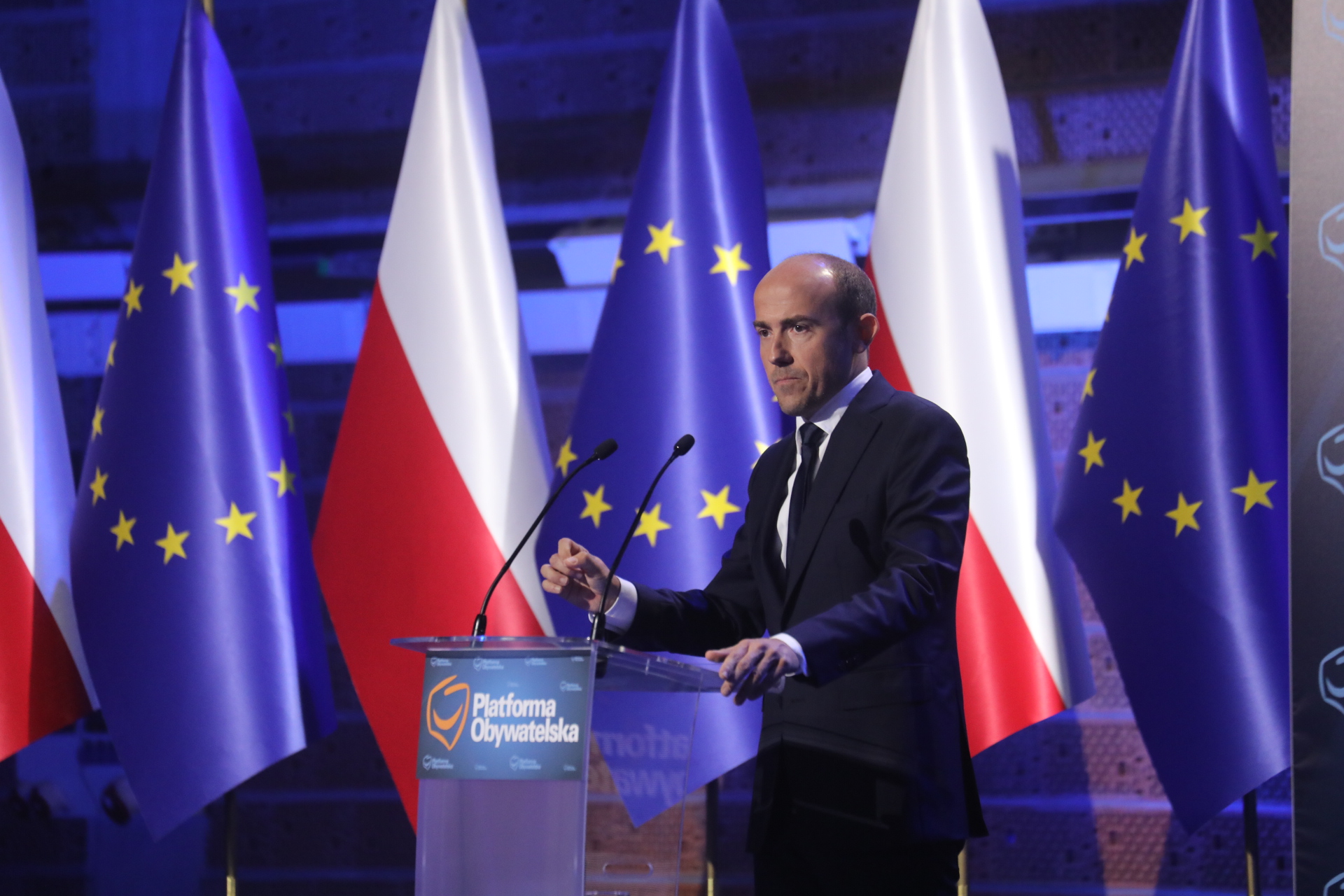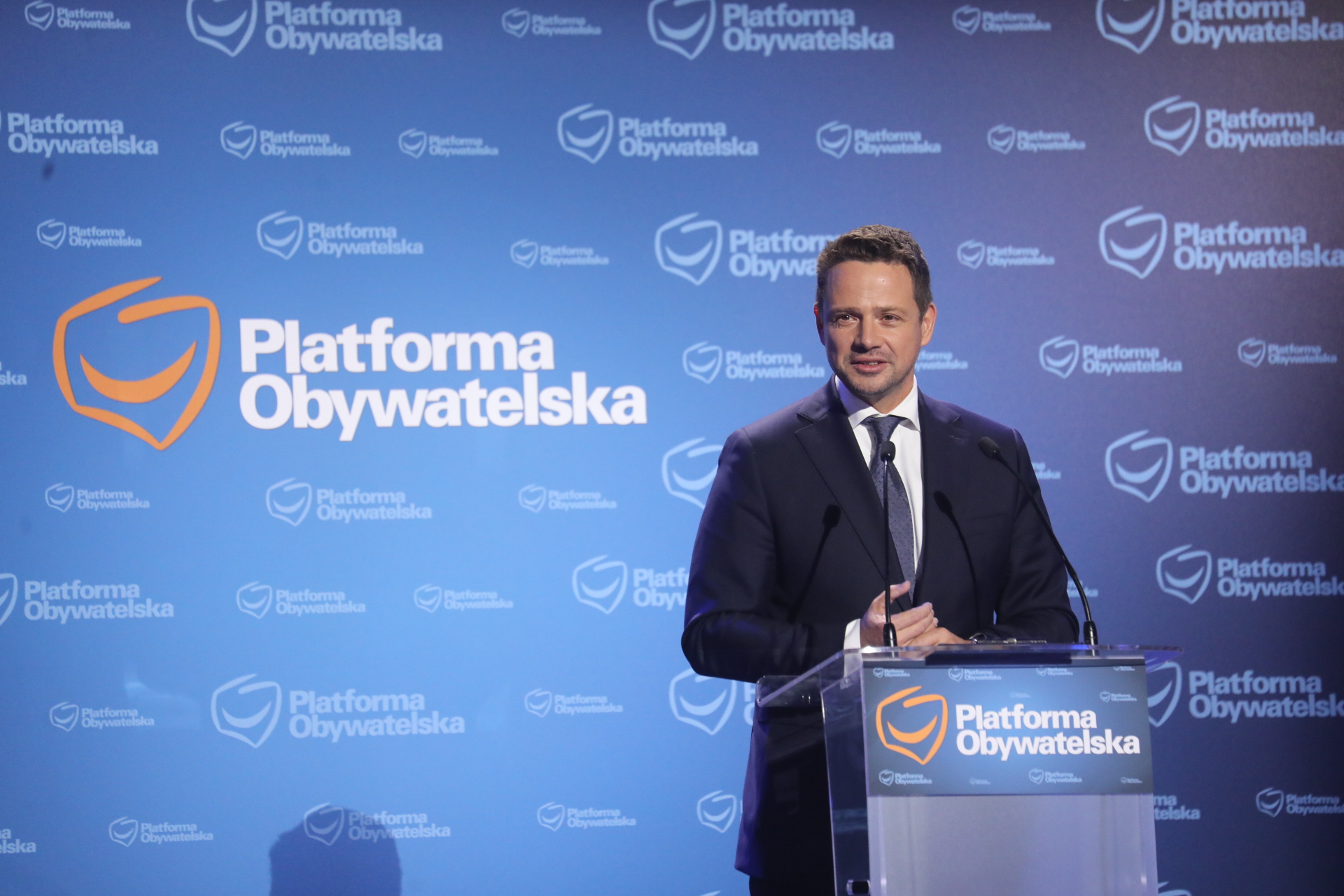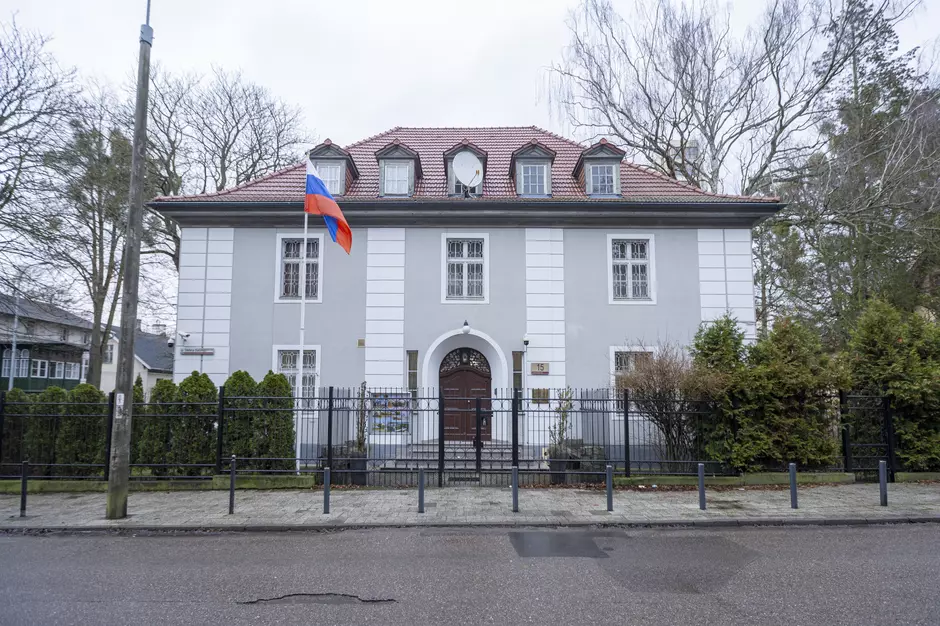By Daniel Tilles
Civic Platform (PO), Poland’s main opposition party, turns 20 today. After its founding in 2001, PO became one of the most successful political groups in modern Polish history. Between 2007 and 2015, under the leadership of Donald Tusk, it served what was then an unprecedented two terms in government at the head of a coalition with the Polish People’s Party (PSL).
Yet the six years since have been marked by repeated failure. Not only has PO lost six elections in a row to the ruling national-conservative Law and Justice (PiS) party; it has also lost direction, purpose and leadership. The party must now ask itself serious questions about how to move forward – and whether, without undergoing major changes, it is actually hindering rather than helping opposition to the government.
The living dead
Back in 2018, when PO had just lost the third of those elections, I warned (in an article co-written with Tom Junes) that:
the danger is that PO will lumber on as a kind of zombie party, maintaining a solid core of supporters but never offering enough to attract floating voters, while also either absorbing or undermining other opposition forces. This would deny Poland’s opposition the new leadership and clearer, more positive narrative that it requires if it is to challenge PiS.
Since then, PO has lost three more elections and, despite finally ditching its uninspiring leader Grzegorz Schetyna, looks no more effective under his successor, Borys Budka.

Borys Budka, leader of Civic Platform since January 2020
This week, the party suffered another blow, as two lawmakers abandoned it and switched allegiance to a rival opposition group, Poland 2050 (Polska 2050).
One of them, Jacek Bury – an independent senator who had previously caucused with Civic Coalition (KO), in which PO is the dominant party – announced his departure by warning that “PO is dying and dying but cannot die out”. He continued:
if I asked in PO where they are on the left-centre-right axis, they would start scratching their heads and ask Budka: “tell us where we are supposed to be”…Can anyone say if PO has a programme? After a year of being in their caucus, I don’t see one. There are just efforts to comment on what PiS has done.
As this suggests, for most of its time in opposition PO has focused on criticising the government without offering any positive alternative vision of its own. This has allowed PiS to successfully attach to PO the label “total opposition” (a term in fact first used by Schetyna), with the suggestion that it has no interest in acting constructively in the national interest, only in undermining the government.
The pandemic has highlighted the deficiencies of PO’s opposition-at-all-costs attitude. The coronavirus crisis has offered two realistic choices for responsible opposition parties: support government policies or propose a viable alternative. PO has done neither: it has repeatedly criticised PiS for its response to the pandemic but failed to make clear what it would have done differently.
Lack of leadership, vision and strategy
PO’s difficulties stem from three related deficiencies: leadership, vision and strategy. Political parties in post-1989 Poland are often dominated by single figures, and that was long the case with PO and Tusk. Since his departure in 2015, the party has failed to find a successor. The fact that, before every recent election, there has been talk of Tusk returning to help PO highlights how the party has struggled to move on.
In a poll last month asking who the leader of the opposition is, the most common answer among respondents was “no opposition politician deserves to be called that”. Only 2% named Budka. A separate survey this week found that only 17% of Poles trust Budka while 49% distrust him. When Schetyna was leader he received similar results.
🔴 Pierwszy ranking zaufania do polityków w 2021 roku!
TOP 3⃣ – zaufanie@MorawieckiM 43,7%@szymon_holownia 43,3%@AndrzejDuda 41,9%
TOP 3⃣ – brak zaufania@ZiobroPL 61,7%#Kaczyński 57,5%@SasinJacek 56,6%@IBRiS_PL dla @OnetWiadomosci https://t.co/tAQ4oxQwD2 pic.twitter.com/bnkuj38vHI
— IBRiS (@IBRiS_PL) January 19, 2021
A further problem is that PO no longer knows what it stands for. Admittedly, even when it was winning elections the party was not very ideological. It always incorporated a range of views, including a conservative wing as well as social liberals. Yet under Tusk the party had a clear sense of purpose, in particular advancing Poland’s EU integration in the post-accession period, and an overall feeling of outward-looking openness.
Yet by the end of its second term in office, it had clearly run out of ideas. And in the six years since then, it has failed to come up with new ones. Moreover, it is now up against a party, PiS, that has a clear vision of the kind of Poland it wants to create – conservative, Catholic, with a strong role for the state – and which has proposed and implemented a specific set of policies to achieve that.
Moreover, as Polish society has become more divided – especially over socio-cultural issues such as LGBT rights – PO has found its big-tent centrism harder to maintain. PiS has a clear position on the conservative side of such issues, while the Left – an alliance of three parties that is the second largest opposition group in parliament – is firmly on the other.
But PO has tried, with little success, to stand somewhere in the middle. The party contains, on the one hand, Rafał Trzaskowski, who as mayor of Warsaw has openly supported LGBT rights (at least rhetorically, if not so much in practice). By contrast, a number of its mayors in smaller cities and towns have sought to ban LGBT parades.
Being ideologically flexible and accommodating can bring advantages. But it can also – especially with poor leadership – lead to contradiction or silence. That has been the case repeatedly with PO. Schetyna once infamously presented three different positions on the party’s refugee policy in one week. Often, he and Budka have had little to say at all on big issues.
Whereas Tusk had a keen sense for the public mood, Schetyna and Budka have been reactive, swinging back and forth in response to criticism and polling. (Though Tusk is also to blame for failing to cultivate any effective leaders to succeed him.)
The party has since last year been working on a new “declaration of ideas” that will set out its position more clearly. It was meant to be launched at an event to mark today’s anniversary, but that has been delayed due to the pandemic.
Reports indicate that the document will continue PO’s fence-sitting on many of the most contentious but important matters. “We are not an ideological party, so issues like abortion will not be included in the declaration,” says Tomasz Siemoniak, PO’s deputy leader tasked with overseeing work on the text. Another longstanding difficulty for PO – whether to support same-sex civil partnerships – will also reportedly not be addressed.
W PO spór ws. nowej deklaracji ideowej: Tak dla rozdziału Kościoła od państwa, nie dla aborcji https://t.co/v55dilblDl
— gazetaprawna.pl (@gazetaprawnapl) December 18, 2020
The final issue for PO has been its strategy. For the last few years, the party’s mantra has been to call for all opposition forces to unite (under PO’s leadership, of course) in order to oust PiS. Ahead of elections it has formed various coalitions, with parties ranging from the centre-right PSL through the liberal Modern (Nowoczesna) to the centre-left Democratic Left Alliance (SLD).
Yet this approach simply exacerbates PO’s existing problems. The broader its coalition and the more parties it contains, the harder it is to have clear leadership or a single vision beyond being anti-PiS – which, as has been shown time and again, is not enough.
PO’s constant rearranging of deckchairs, as it seeks some combination that can defeat PiS, also allows it to avoid the much harder questions and challenges required to move forward: working out what it stands for, who it wants to appeal to, and what it can offer them.
Hope in Trzaskowski?
In defence of their united-opposition strategy, some among PO and its supporters have pointed to last year’s presidential campaign, in which Trzaskowski, standing on behalf of KO, came close to victory.
In the first round, when a range of candidates were standing, Trzaskowski obtained 30% of the vote against 43.5% for the PiS-supported incumbent, Andrzej Duda. But in the second-round run-off, when voters were forced to pick between the top two, Trzaskowski only narrowly lost, with 49% to Duda’s 51%.
Yet presidential elections – more about a single candidate than a party – are very different from parliamentary ones. Moreover, Trzaskowski’s relative success also served to highlight some of PO’s failings.

Warsaw mayor and Civic Platform deputy leader Rafał Trzaskowski
During his campaign, Trzaskowski downplayed his party identity. PO and KO branding was largely absent at his events and in advertising.
He also benefited from offering some of the things that his party has lacked in recent years. His campaign was generally positive, setting out a vision (albeit with little policy detail) of the kind of Poland he wants to create, rather than just attacking PiS and Duda. And Trzaskowski himself provided the kind of leadership, public speaking skills, and energetic campaigning that others in PO have failed to offer.
Yet since the election, this momentum has been squandered. Trzaskowski’s plans to launch a new “social movement” were delayed until October, three months after the election. Since then, his Common Poland (Wspólna Polska) group has done nothing of note. Trzaskowski himself has returned to his duties as Warsaw mayor, with PO making little use of the prominence and popularity he gained during the election.
The party has, meanwhile, slipped back into its old ways, criticising PiS without offering a clear alternative. Even when opportunities for political gains have appeared, PO has remained too hesitant to take them.
The recent mass protests against a ruling that would outlaw almost all abortion in Poland saw PiS’s support drop sharply in the polls. But PO failed to capitalise. Without a clear line from the leadership, some in the party advocated for maintaining the current abortion law, but others pushed for liberalisation.
One of PO’s most senior figures – the speaker of the Senate, Tomasz Grodzki – highlighted how out of touch many in the party are by expressing support for the largely young, female protesters in patronising manner:
It is women who make our everyday life run harmoniously and smoothly in a way that is somewhat imperceptible, and only when our grandmother, mother, wife, daughter or partner has to step aside for some reason, do we notice that without women our existence becomes more difficult, colourless, irritating.
As a result, PO has not benefited from PiS’s difficulties over the issue, nor from criticism of the government’s handling of the coronavirus second wave.
In the autumn, PiS’s support dropped from an average of 40% in September to 31% in November, according to poll aggregator Ewybory.eu. Yet in the same period, KO also fell slightly, from 24% to 23.5%. Since November, PiS has recovered somewhat, reaching an average of 35% so far this month, whereas KO has continued to fall, to 20.5%.
The party that has gained the most is Polska 2050, a new centrist group, which has risen steadily from 10.5% in September to 16% this month.
When departing KO’s parliamentary caucus this week to align with Polska 2050, Senator Bury predicted that more would follow. However, he believes that the true “exodus” will not happen until 2023, ahead of that year’s elections, when people see how badly PO is doing in the polls.
Rising from the dead?
What PO does in those two intervening years will be decisive not only for the party’s own future, but for that of Polish politics and democracy. The party still possesses the funds, nationwide structure and experience to provide the most viable alternative to PiS. Without direction, however those resources are not only wasted, but also act to the detriment of the wider opposition – and could help PiS win an unprecedented third consecutive term.
Indeed, although PO would be loath to admit it, PiS itself offers an example of how PO could turn things around. It too endured eight long years in opposition from 2007 to 2015, losing seven elections in a row to PO. Even in early 2015, PiS was trailing PO in polls for that year’s presidential and parliamentary elections.
Yet PiS quickly and dramatically turned that situation around. Its leader, Jarosław Kaczyński, realising his own personal unpopularity, took a back seat. A little-known MEP, Duda, was picked as the party’s presidential candidate. After his energetic campaign successfully unseated the PO-backed incumbent, Bronisław Komorowski, Duda’s campaign manager, Beata Szydło, was picked to front the parliamentary campaign, during which PiS presented clear ideas and policies.
As 2015 showed, momentum can shift quickly in politics, especially with voters tiring of a long-serving ruling party. But for that to happen, it requires an opposition able to take advantage of the situation. At the moment, PO is unable to do that, and it is in danger of preventing others from doing so too.
Main image credit: Platforma Obywatelska RP/Flickr (under CC BY-SA 2.0)

Daniel Tilles is editor-in-chief of Notes from Poland. He has written on Polish affairs for a wide range of publications, including Foreign Policy, POLITICO Europe, EUobserver and Dziennik Gazeta Prawna.




















